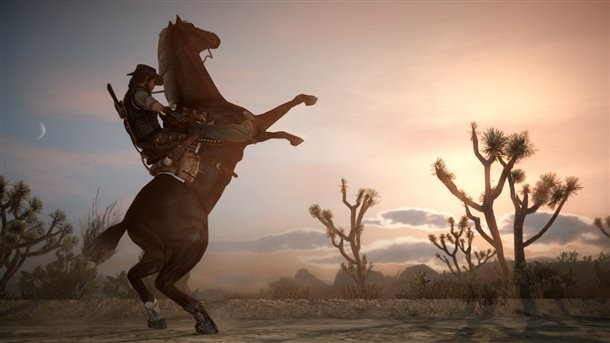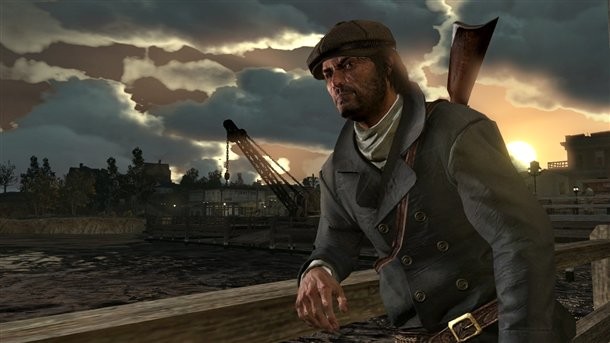The Virtual Life: Red Dead Redemption, Grand Theft Auto IV, And The Great American Lie
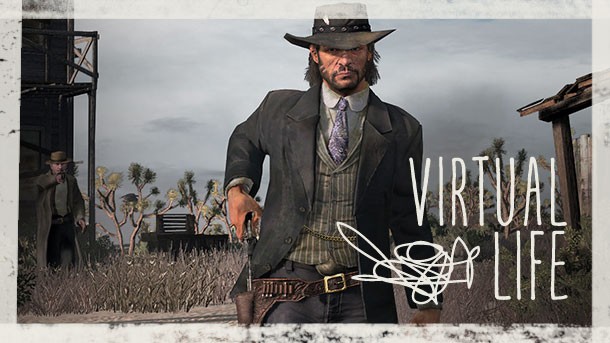
This week I’m talking about Red Dead Redemption and Grand Theft Auto IV, so spoilers for both of those.
There is perhaps no other developer that’s catalog has represented the complicated struggle for cultural recognition that video games have undergone more visibly than Rockstar Games. In the early aughts, titles like Grand Theft Auto: San Andreas, State of Emergency, and Manhunt cemented Rockstar as the edgy poster child of interactive entertainment, the developer that could make high-quality, polished experiences that pushed the boundaries of what could be shown on screen.
This is indicative of an era where developers, publishers, and gamers were constantly trying to prove that Games Could Be Things That Adults Could Enjoy Too, Thank You Very Much. What this usually meant was violence became more graphic, innuendo became outright sexual mimicry, and games more or less sought to emulate the look and structure of blockbuster action movies. In this pursuit, Rockstar had remarkable success in chasing the films of Michael Mann and John Singleton to reinforce a very particular version of maturity for video games. Much like a teenager or a child might see cigarettes, gambling, or alcohol not as perks of being an adult but instead the central tenants of adulthood, games of this era, particularly Rockstar games, clung to the idea that edginess was the essence of sophisticated, mature experiences in games.
And then in the latter half of the aughts, something happened: the sea change. More developers embraced a different idea of maturity and what the medium was capable of. Between 2008 and 2010, Rockstar Games released two games that were at once very much in line with sort of open world, do-whatever-the-hell-you-want action titles it had been developing for nearly a decade while also being exceptionally different: Grand Theft Auto IV and Red Dead Redemption. There’s a strong through-line that runs between the two games: both developed on the same engine, both starring men with dark histories, both of them turning a critical eye onto The American Dream.
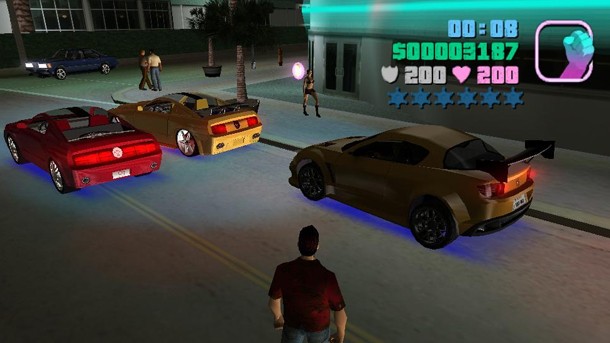
As an ideological entity, America has always existed at the crossroads of two ideas that are seemingly incompatible with one another:
1. You are who you choose to be and can shape your own destiny. If you work hard and pull yourself up by your bootstraps, you will achieve your dreams.
2. You do not have the ability to be whoever you want to be. Your destiny is shaped completely by a number of socioeconomic factors that are beyond your control. You are at the total mercy of inhuman, interconnected systems capable of annihilating your body and spirit through malice, chance, or negligence.
The truth is that the actual American experience is some combination of these two philosophies, with our choices playing some part in how our lives play out but whatever socioeconomic situation each and every one of us is born with giving us a set amount of opportunity space to use to make the best of those choices. For a number of people this works out; they’re able to pair the right choices with the right opportunities to make a stable life. Some people are born with a nearly infinite amount of opportunities and then spend the rest of their life wasting whatever talent they have on the frivolity afforded to them, while some talented underprivileged people spend their whole lives trying find the right opportunity to make their hard work bear fruit. It’s this imbalance that both Grand Theft Auto IV and Red Dead Redemption target.
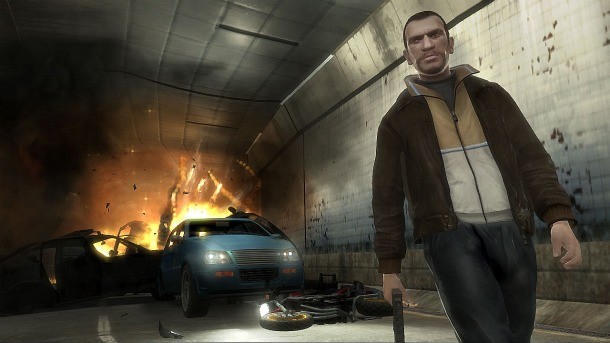
GTA IV’s story is centered around a Serbian immigrant coming to Liberty City to start over, another soul trying to run down The American Dream and bottle it for himself. Our protagonist Niko Bellic is probably not a good man by most definitions, having participated in human trafficking and not being above stealing cars and carrying out contract hits, but there’s a tragic quality to his character that makes him more compelling than your run-of-the-mill anti-hero. Namely: Niko seems to earnestly want to get away from his violent past, lamenting the past and hoping for the best, saying “Perhaps here…things will be different.” Niko is sold on America's promise by his cousin Roman, who brags about his riches and his luck with the ladies, but this all turns out to be a lie, with Roman running a failing taxi service and being hounded by loansharks. Niko, unable to let his cousin bear the wrath of these gangsters, finds himself caught up once again in the violence of his past.
While it’s certainly a fair thematic reading that Niko is simply reaping the sins of his past, forever closed out of the promised land for his crimes against humanity, it’s hard to deny the economic forces at play in GTA IV. Niko is exceptional when it comes to killing, stealing, and generally causing mass mayhem. These are skills that are valued by a number of employers in the gray purgatory-esque Liberty City. As players, we can resent Niko for falling back into a life of violence and crime sure, but this is also an immigrant who has come to a place in search of a new life and has found only xenophobia, racism, and that old familiar violence waiting for him. What were the other options, really? Working a low-paying job to scrap together rent every month only to be distrusted and disliked by his employers and whoever he was servicing? His decision to re-enter his life of crime might be lamentable, but the temptation to do so is at least understandable.
The odds were stacked against him from the get-go, and it’s difficult to watch the hope for that new life in the supposed land of opportunity dissipate, especially in the final act of the game, with Niko, foolishly and finally thinking he might achieve some semblance of peace, watching as someone he loves dearly is cut down in a hail of gunfire and later somberly musing as the game closes out: “So this is what the dream feels like? This is the victory we longed for.”
Continue on to page 2 to find out how Red Dead Redemption confronts The American Dream.
The thing about dreams? Most of the time they’re lies, and The American Dream is no exception. While Grand Theft Auto IV confronts America’s ethos and situates it in a post-9/11 setting, Red Dead Redemption travels back to the past to take on the country’s holier-than-thou embrace of meritocracy. John Marston, unlike Niko, is not an immigrant but an American citizen with a troubled upbringing who joined a gang of outlaws near the end of the 19th century and spent a chunk of his adulthood committing crime until a bank robbery ended with him shot, left for dead, and abandoned by his adoptive family. Marston, wanting a new start, leaves behind his life of crime to marry, settle down on a ranch with his family, and live happily ever after.
Of course, things aren’t ever that easy, are they? Martson’s past comes knocking in the form of unscrupulous government stooge Edgar Ross (a man hell-bent on clearing The Old West of outlaws) who forces Marston to hunt down his old gang, promising that if he does the government’s dirty work for them, Ross and his associates will let Marston live in peace with his family. During his journey, our cowboy comes across many colorful characters looking to make a buck, like snake-oil salesman West Nigel Dickens, as well as signs that civilization is bearing down hard on what remains of the west's beautiful, peaceful wilderness.
Perhaps the most uncomfortable sequences in Red Dead Redemption are with Nastas, a Native American character who has witnessed the bloody, painful losses of his tribe to invaders' cruelty and the policies of the federal government and is regularly berated and insulted by white, incredibly racist scientist Harold MacDougal. In the end, Marston finds not a land teeming with opportunity but instead with people who have been broken by the cruelty of others, the violent manifestations of political ideology, or left to die by the government that's supposed to protect their interests. It's a bleak, albeit beautiful odyssey, that's brought to a soul-crushing finish with a betrayal that was all but inevitable.
Marston does what’s required of him, hunting down every one of them, and Ross seemingly holds up his end of the bargain, returning Marston’s wife and kid to their ranch. After having just enough time to reconnect with his wife and son, Ross shows up to the ranch with an entire platoon and murders Marston while his family escapes. Like Niko, Marston never really had a chance. The moment he ceased to be useful as a tool to the powers that be, he was doomed. It's a grim conclusion but it's what happens when you have systems in place that reward people for seeing other people, especially those they have power over, not as human beings but instead as numbers on a spreadsheet: in the end the profit margin will almost always trump someone's quality of life or even life itself, and Marston's corpse had use to Ross as a trophy to show the agent was doing his job.
None of this is to say that either game is effective as a nuanced work of social critique. After all, both games command that you commit violence to progress through both of them while halfheartedly condemning the violence that their protagonists commit. However, these critiques, as weak they may be, point to a growing awareness in games about real-world woes and that awareness is, in my eyes, more mature than any of the edginess that Rockstar's games spent the first decade of the century embodying. It's a strange comfort that, in distressing times such as these, there are works in this fledgling medium that are at least somewhat honest about this country's grandest failures and delusions of nobility and prosperity.


Get the Game Informer Print Edition!
Explore your favorite games in premium print format, delivered to your door.
- 10 issues per year
- Only $4.80 per issue
- Full digital magazine archive access
- Since 1991
